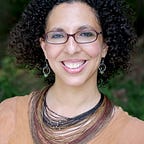We are all Migrants.
The story of human civilization is the story of migrations. We are all where we are because our ancestors, individually and collectively, moved across the earth and settled in new places. All of us are from somewhere else. In moving, we sought something better for ourselves, our communities and our descendants. There is no historical narrative that shows otherwise.
The history of the continents we now call North and South America tells the story of a more recent set of migrations. The migration of people from Western Europe just around five hundred years ago radically re-shaped the people and culture who were here for millennia. During a period of only about 300 years, the people who were here — Aztec and Zuni, Carib and Tupi, Iroquois and Ojibwe — were permanently altered by migration. They could not escape the migratory zeal of those individuals who chose a better life and more opportunities here.
Migration is not always a net positive. But it is a fact of human existence.
During the most fertile period in which the Silk Roads operated through Asia, Africa and Europe, migration enabled trade. It defined a global economy. It shaped religious thought. It codified language. It is because of migration that most human languages are deeply embedded with sounds, words, phrases and meanings that traverse cultural or linguistic boundaries. It is early migrations that introduced new ways of cooking and eating to people across cultures. It is because of migrants that Europeans know spices and perfumes and pigment. It is migration that has allowed us to discover and settle and transform and adapt to new places and ways of life over our long human history. We are none us any one thing, any one culture or ethnicity or place. We are a story of change.
Migration is proof that we can be complex, deeply rooted and utterly malleable. It is proof that culture itself is permeable and fragile. Change is encoded in our collective being.
The history of the United States is short. We have been a nation for just a little over two hundred years. Our laws and rituals and belief systems are still perhaps more nascent that we give them credit for, and certainly more fragile. Migration into the United States is caught in a dialogue about who gets to belong to this political space we inhabit. Some of us inhabit this space by choice and others by birth. Who has more right to it? The one who is here by accident of birth or the one who struggles and strives to find her way here?
Migration is a choice. Change is a necessity.
My personal story is one of collective migration, abduction and selective immigration, and it represents the spectrum of how people have come to this Atlantic-Pacific continental shelf. My mother’s maternal grandmother was Tupinamba, the indigenous people who settled in coastal, northern Brazil a few thousand years ago. On her side, my genetic existence in this hemisphere predates anyone of European descent who claims ownership of this land. My mother’s maternal grandfather, on the other hand, was a Dutch trader, a European opportunistic who migrated to Brazil to exploit its resources, and its people. He accomplished both. He left northern Europe in search of opportunity and wealth. He was not invited. Chances are he barely learned the language. But he was supported by a system that enabled his pursuits and so off he traveled to Brazil to find something better. Change, when it begins, has its own momentum.
My mother’s father was a descendant of people from West Africa, possibly of the Kongo Empire, who were abducted by European slave traders and brought to Brazil to work. His forced migration was not a choice. Our ancestors along the middle passage suffered but not to find something better. Once here, though, after time, life on this side of the Atlantic was all they knew. My grandfather still carried with him the language and the religious rituals of his home country, passed down to him by his father but sadly lost in translation by the time my mother was born and made her way, by choice, to the United States. Her choice, her immigration from Brazil to the United States, was not easy either. But it was done with intent. She hoped to find something here and in return to bring something of herself, her culture, her heritage to a new place of opportunity. She has not always been welcomed with tolerance but she has contributed unending value to others. Her very presence is a demonstration of a greater humanity that we all share. Our desire to belong. Our desire to make a difference. A way of being human that embraces otherness and likeness in equal measure.
We, all of us, are migrants. Many of us are immigrants and the children or grandchildren of immigrants. Our right to the resources and the culture that currently resides in this space is fleeting. It will change. It must change. It is the history of the world. It is our collective story. When we think about what migration and immigration have given us, how can we in good conscious fight against it? How can we fight against our own humanity?
As the Supreme Court chooses to side with power over people, and with politics over history in its decision to uphold the travel ban against the select few countries our government has deemed dangerous; and as we continue to demonize migrating human beings at our southern borders, we would do well to take a journey into history. We would do well to journey back into our ancient past but even to look back along our own family tree.
We are all migrants. We all belong. Let us in.
